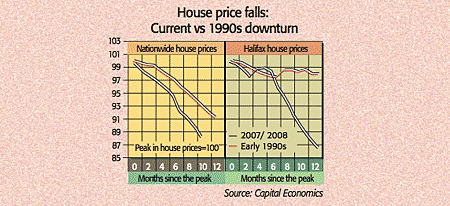
“The Good Ship Great Britain is holed and going down”, as Damian Reece said in The Daily Telegraph. Grim data and forecasts are piling up. Unemployment is already at an eight-year high, while Capital Economics expects house prices to have slid by 35% from their peak by late next year. This week the quarterly CBI Industrial trends survey revealed the lowest confidence reading among manufacturers in 28 years. 16% of respondents said trouble obtaining external finance was hampering activity, a reflection of how the credit crunch is spreading throughout the economy.
No wonder then that The National Institute of Economic and Social Research foresees a 0.9% contraction next year, the first full-year of recession since 1991. Consumption will slide by 3.4% while business and housing investment will shrink, too. Citigroup’s Michael Saunders expects another million job losses as households and businesses, “after the searing experience” of seeing house prices tumble and credit “evaporate”, stop borrowing and start saving.
Keynes to the rescue?
The state, having become the lender of last resort, is now “gearing up to be the spender of last resort”, said The Guardian. Chancellor Alistair Darling intends to bring forward spending on health, education, the housing and energy sectors and major infrastructure projects in order to counter the downturn. But as The Times pointed out, capital spending moves slowly, so much of the boost will not arrive until the recession has set in.
In any case, Britain is hardly in a position to implement a Keynsian “counter-cyclical spending binge” as we’ve already had a pro-cyclical one, said Ian Campbell on Breakingviews.com. Rather than save money in the good times, the government racked up a budget deficit set to hit 4% this year. Public sector borrowing in this fiscal year, thanks to the dwindling economy, is already running at 75% more than last year; now near-term borrowing will rise further thanks to the pump-priming. The money will have to be repaid with tax hikes or spending cuts, which will hamper the eventual recovery, said Capital Economics
Will rate cuts help?
Monetary policy, however, is unlikely to be much help either. The impact of rate cuts will be blunted since demand for loans will be subdued. Consumers are hunkering down and cash-strapped banks’ desire to beef up their margins means they are unlikely to pass on all of the cut in the main rate, noted Larry Elliot in The Guardian. There is no silver bullet for empty state coffers and a burst debt bubble. As Ambrose Evans-Pritchard said in The Daily Telegraph, “the world stole prosperity from the future, year after year… now the future has arrived”.